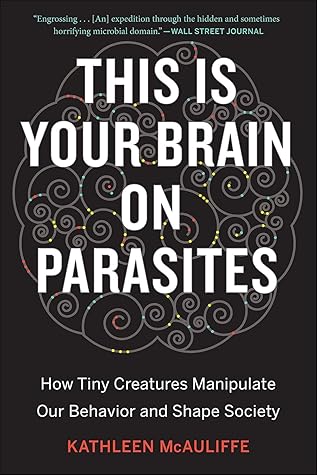More on this book
Community
Kindle Notes & Highlights
Malaria, presently among the most deadly infectious agents on the planet, is arguably the greatest mass murderer of all time. Experts estimate the disease has killed half of all people who have roamed the planet since the Stone Age.
Ideas that challenge the status quo tend to be resisted, and “pathology,” she said, “is the default explanation”—the conservative fallback position, even if it’s the least likely possibility.
Humans may be more cooperative subjects, but scientists who suspect that mental illness or other aberrant behavior might be linked to parasites hit an even bigger obstacle: they can’t infect people with their bug of choice and then watch to see if the subjects’ habits or dispositions change.
“I convinced my wife to go on a romantic holiday in the area because there was a hotel with a very nice restaurant with foie gras, and a hot-water spa nearby,” Thomas told me. A mischievous smile spread across his face as he relayed this, hinting that he might have brought her there under false pretenses. After they had a lovely meal, he went on, he did not retire to the hotel room with her but retrieved test tubes from the trunk of his car and returned to stake out the pool.
Presently, the probiotics in foods like yogurt are chosen by companies based on consumers’ taste preferences and other commercial considerations, so trying to harness them for therapeutic purposes, said Cryan, is “like going into a pharmacy and picking random pills hoping that they’ll affect the brain in a beneficial way.”
According to microbiome expert Mark Lyte at Iowa State’s College of Veterinary Medicine, the brain above may even have evolved as an outpost of the gut’s nerve network, in which case the second brain came first. So
Interestingly, cattle and horses, which can’t lick their own penises, are much more prone to STDs—one of the reasons, according to the Harts, they’re bred by artificial insemination. Humans, they add, are also very susceptible to STDs, possibly owing to similar anatomical limitations.
insufficient sleep immediately before or after receiving a vaccine reduces the body’s immune response by half, greatly diminishing the protective benefits of inoculation—something to keep in mind when you’re due for your next flu shot.
Intriguingly, several studies indicate that lowering concerns about the risk of infection—for example, by vaccinating subjects—can effectively shut down the behavioral immune system, suppressing prejudicial feelings that would otherwise arise when the threat of contagious disease is made salient. In one notable experiment, being allowed to use an antibacterial wipe to disinfect hands when reminded that the flu was going around decreased negative attitudes toward a variety of perceived outgroups, including illegal immigrants, Muslims, the obese, and the disabled—and the reduction was most
...more
fear of germs does more than slant people’s religious and political views. It literally leads them to think of morality in black-and-white terms—a finding with disturbing ramifications for the criminal justice system.
people who are the most repulsed by unhygienic behavior score higher than average on a test of orientation toward punishment—that is, they are the most likely to endorse throwing criminals into jail and imposing stiff penalties on those who break society’s rules.
a study of people serving as mock jurors found that those highly prone to disgust were more inclined to judge ambiguous evidence as proof of criminal wrongdoing, to impose stiffer sentences, and to see the suspect as wicked. Compared to their less easily revolted counterparts, they were also more prone to harboring an exaggerated sense of the prevalence of crime in their own neighborhoods.
Countries under severe parasite stress were more likely to be controlled by dictators; gender inequality was pronounced, and wealth tended to be concentrated in the hands of a small class of elites. In contrast, countries with the least amount of infectious disease had wealth more equitably distributed; their women were on a more equal footing with men, and individual rights were far more extensive. They were overwhelmingly democracies.
By investing more in health care up front, Thornhill’s model predicts, Western countries might not have to spend so much on warfare later—and may ultimately reduce human suffering far more effectively.


